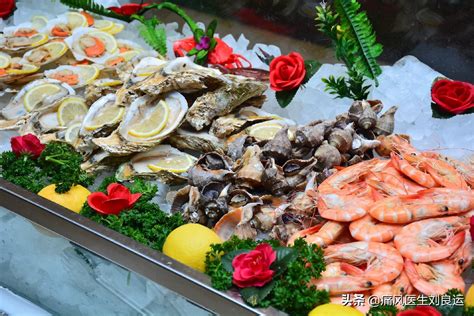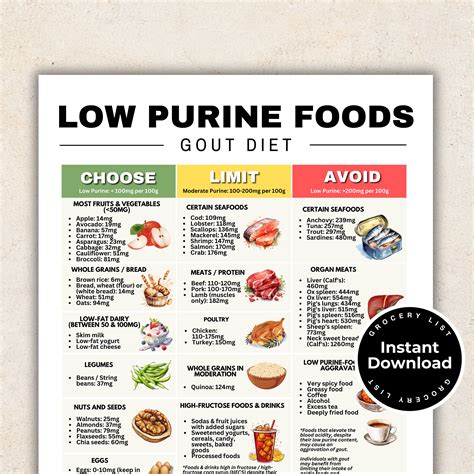Intro
Discover foods that trigger gout attacks, including purine-rich foods, seafood, and sugary drinks, to help manage gout symptoms and prevent flare-ups naturally.
Gout is a type of arthritis that causes sudden and severe attacks of pain, swelling, and redness in the joints, often occurring at the base of the big toe. It is a common condition that affects millions of people worldwide, and its symptoms can be debilitating and disruptive to daily life. While gout is often associated with genetic and environmental factors, diet plays a significant role in triggering and managing the condition. Certain foods can increase the risk of gout attacks, while others can help alleviate symptoms and prevent future episodes. In this article, we will explore the foods that cause gout, their impact on the body, and provide guidance on how to make informed dietary choices to manage the condition.
Gout is caused by an excess of uric acid in the blood, which can form sharp crystals in the joints, leading to inflammation and pain. Uric acid is a byproduct of the breakdown of purines, substances found in many foods and drinks. When the body produces too much uric acid or has difficulty removing it, the risk of gout increases. Foods that are high in purines, such as red meat, seafood, and sugary drinks, can contribute to elevated uric acid levels and trigger gout attacks. Additionally, foods that are high in sugar, salt, and unhealthy fats can also exacerbate the condition.
The relationship between diet and gout is complex, and understanding which foods to avoid or limit is crucial for managing the condition. By making informed dietary choices, individuals with gout can reduce their risk of attacks, alleviate symptoms, and improve their overall quality of life. In the following sections, we will delve into the specific foods that cause gout, their effects on the body, and provide practical guidance on how to incorporate gout-friendly foods into your diet.
Introduction to Gout-Causing Foods

Red Meat and Gout
Red meat is a significant contributor to gout, as it is high in purines and can increase uric acid production. A study published in the Journal of Rheumatology found that consuming red meat regularly can increase the risk of gout by 21%. The high purine content in red meat can lead to an increase in uric acid levels, which can crystallize in the joints and cause inflammation. To reduce the risk of gout, it is recommended to limit red meat consumption to 1-2 servings per week.Seafood and Gout

Sugary Drinks and Gout
Sugary drinks, such as soda and sports drinks, can also contribute to gout, as they are high in sugar and can increase uric acid production. A study published in the Journal of the American Medical Association found that consuming sugary drinks regularly can increase the risk of gout by 85%. The high sugar content in these drinks can lead to an increase in uric acid levels, which can crystallize in the joints and cause inflammation. To reduce the risk of gout, it is recommended to limit sugary drink consumption to less than 1 serving per day.Processed Foods and Gout

Gout-Friendly Foods
While certain foods can trigger gout attacks, others can help alleviate symptoms and prevent future episodes. Gout-friendly foods are typically low in purines, sugar, and unhealthy fats, and high in antioxidants, fiber, and omega-3 fatty acids. These foods can help reduce uric acid production, increase uric acid excretion, and reduce inflammation. Examples of gout-friendly foods include: * Fruits, such as cherries, berries, and citrus fruits * Vegetables, such as leafy greens, bell peppers, and cucumbers * Whole grains, such as brown rice, quinoa, and whole wheat bread * Lean proteins, such as chicken, turkey, and fish * Low-fat dairy products, such as milk, cheese, and yogurtManaging Gout through Diet

Practical Tips for Managing Gout
To manage gout through diet, follow these practical tips: * Keep a food diary to track your food intake and identify trigger foods * Limit red meat consumption to 1-2 servings per week * Choose low-purine seafood options, such as fish and squid * Limit sugary drink consumption to less than 1 serving per day * Incorporate gout-friendly foods into your diet, such as fruits, vegetables, and whole grains * Stay hydrated by drinking plenty of water * Maintain a healthy weight through a combination of diet and exerciseConclusion and Next Steps

We invite you to share your experiences with gout and diet in the comments section below. Have you found any specific foods that trigger or alleviate your gout symptoms? What dietary changes have you made to manage your condition? Share your story and help others who may be struggling with gout.
What are the most common foods that trigger gout attacks?
+The most common foods that trigger gout attacks are red meat, seafood, sugary drinks, and processed foods. These foods are high in purines, sugar, or unhealthy fats, which can increase uric acid production, reduce uric acid excretion, and exacerbate inflammation.
Can diet alone manage gout?
+Diet plays a significant role in managing gout, but it is not the only factor. A combination of dietary modifications, lifestyle changes, and medical treatment can help manage gout and reduce the risk of attacks. Consult with your healthcare provider to develop a personalized treatment plan.
Are there any specific foods that can help alleviate gout symptoms?
+Yes, certain foods can help alleviate gout symptoms. Gout-friendly foods, such as fruits, vegetables, and whole grains, are low in purines, sugar, and unhealthy fats, and high in antioxidants, fiber, and omega-3 fatty acids. These foods can help reduce uric acid production, increase uric acid excretion, and reduce inflammation.
